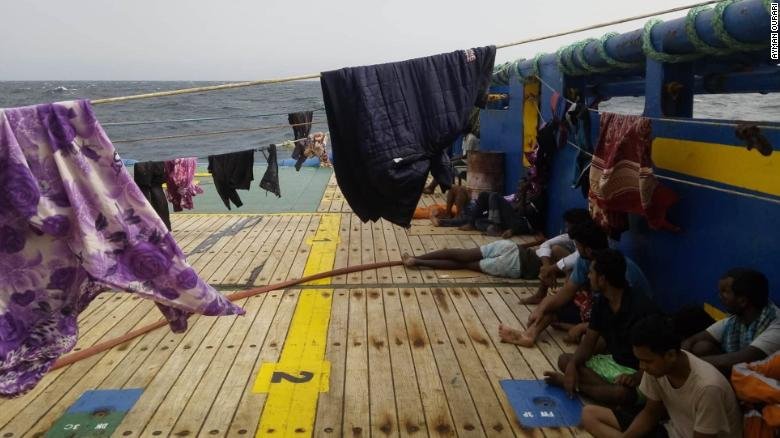On 13 July an offshore platform near the Tunisian coast received a rescue signal from migrants in the sea nearby. Immediately, an emergency vessel was dispatched to investigate and found 40 migrants from different nationalities on a small boat. Some migrants were rescued from the water, and others from their vessel. With no feedback nor action from potential host authorities, and given the worsening weather situation, the migrants were moved to a Tunisianflagged offshore supply ship.
Beginning 16 July, their situation worsened, with high temperatures and shrinking water and food supplies. Denied entry by multiple ports, the migrants were stuck and critically vulnerable. Tunisian Authorities allowed a Tunisian Red Crescent (TRCS) doctor to go onboard and examine the passengers. The medical examination found that amongst the migrants there were two pregnant women, several people with scabies and malnutrition and one with a serious back injury. TRCS made a number of subsequent visits to the migrants and along with Movement partners and other humanitarian organizations advocated for a regional solution where the migrants could safely disembark. On 29 July, the Tunisian Government agreed to receive the migrants and on 1 August, 19 days after they were first rescued, the migrants disembarked in Zarzis and were transferred to a TRCS reception centre and then to a TRCS accommodation centre.
IFRC, TRCS, and other neighbouring National Societies note a spike in the number of migrants being refused docking access. This development will increase the numbers of critically vulnerable migrants and put additional strain on first responders like TRCS. The IFRC is committed to working with the TRCS in assessing the current situation and to be prepared for future developments.
The Tunisian Red Crescent teams of 4 -5 people made five visits to the migrants on the supply ship. In order to undertake these visits, TRC solicited a boat to travel between the port of Zarzis and the ship, some 45 minutes away. During these visits TRCS staff and volunteers provided medical care (including basic drugs), food water, some clothing and shoes as well as psychosocial support. This support was a lifeline for the migrants, who were stranded in cramped conditions and exposed to the harsh elements at sea. TRCS solicited voluntary contributions, including use of boat time and other in-kind donations. IFRC, on behalf of TRCS, wishes to thank all those who generously contributed to the response to date.
On 1 August the migrants disembarked and were taken to a reception centre, where they were registered, given food and water and a medical check-up and psychosocial support. The migrants have since been relocated to TRCS accommodation, where TRCS will continue to meet their daily needs.
The IFRC has actively supported TRCS with humanitarian diplomacy in seeking a solution to disembark safely the migrants. The IFRC Secretary General and the Deputy Director of MENA Region deployed to support Tunis-based IFRC North Africa Office. During the mission, the IFRC delegation joined TRCS to meet with Government, NonGovernmental Organizations and UN agencies to help resolve the humanitarian situation. Through this response, the IFRC will support the NS in assessing the anticipated increase in similar events and possible options for response.




